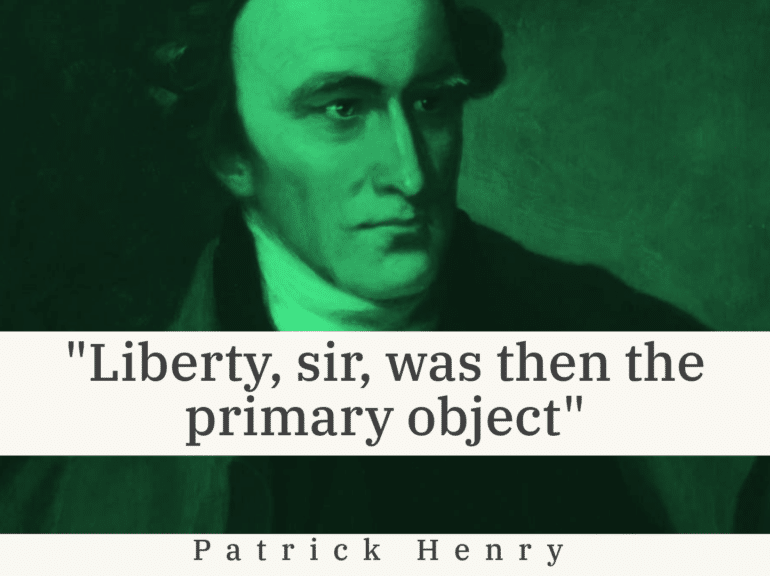
Patrick Henry’s Virginia Resolves: Bedrock Principles of American Liberty
By: Michael Boldin
On his 29th birthday – May 29, 1765 – Patrick Henry helped spark the American Revolution. His Virginia Resolves against the Stamp Act not only dared to defy British rule, but also established a number of bedrock principles that would become cornerstones of American liberty.
The following day he gave a thunderous speech in support of these Virginia Resolves, with his famous line of “if this be treason…” Thomas Jefferson later described the speech as filled with “torrents of sublime eloquence.”
Henry’s Resolutions and speech were more than just an opposition to a single act at a single moment in time. They were loaded with foundational principles – including the following:
- A precursor to the 10th Amendment
Henry took the position that the British Parliament had general powers to address issues that affected all, while issues affecting “internal policy and taxation” could only be implemented by the local representatives of the people in that area. Sounds like Henry helped establish some of the principles behind the Tenth Amendment, doesn’t it? - Precedent and usurpation
As many in the founding generation understood, a single step beyond the limits of the Constitution would, as Jefferson later put it, be the same as giving them a “boundless field of power.” Henry’s resolutions pointed out that “every Attempt to vest such Power” over internal policy and taxation in Parliament rather than the Virginia general assembly would “destroy…American freedom.” - Acts of usurpation are void
Henry’s resolutions said the people “are not bound to yield obedience to any law or ordinance whatsoever,” that attempt to usurp local authority over such internal policy and taxation. Even Alexander Hamilton took this same position years later, pointing out that acts not in pursuance of the Constitution would be acts of usurpation – “and deserve to be treated as such.”
His seven resolutions were passed by the Committee of the Whole and sent to the House for debate the following day, on May 30. Before any action could be taken by the full House, all seven resolutions were sent along to various newspapers – where they circulated throughout the colonies and sparked concrete resistance to the act, including outright nullification by a colonial court in Maryland.
The resolutions were intensely debated in Virginia, and on May 30 only the first five were passed, and by small margins, especially the fifth, which passed by a single vote. As Joe Wolverton noted, “It was during the debate on this fifth and most contentious of the first five resolutions that Patrick Henry spoke words that have been passed into the lore of the early days of American discontent with English rule.”
Biographer William Wirt described his stirring remarks as well as the reaction:
It was in the midst of this magnificent debate, while he was descanting on the tyranny of the obnoxious Act, that he exclaimed, in a voice of thunder, and with the look of a god, “Caesar had his Brutus — Charles the first, his Cromwell — and George the third — ” (“Treason,” cried the Speaker — “treason, treason,” echoed from every part of the House. — It was one of those trying moments which is decisive of character. — Henry faltered not an instant; but rising to a loftier attitude, and fixing on the Speaker an eye of the most determined fire, he finished his sentence with the firmest emphasis) “may profit by their example. If this be treason, make the most of it.”
Wolverton continued:
Content with the passage of his resolutions, Henry left for home, convinced he had accomplished a great work. On May 31, the day after Henry delivered his speech and rode out of Williamsburg, the House reconsidered the resolutions and the fifth and least popular of them was rescinded, leaving only the first four as officially adopted resolutions of the Virginia House of Burgesses. The fifth resolution, the one rescinded by, as Jefferson called them, “the more timid” members of the House, was the one that read:
Resolved, Therefore that the General Assembly of this colony have the only and sole exclusive right and power to lay taxes and impositions upon the inhabitants of this colony and that every attempt to vest such power in any person or persons whatsoever other than the General Assembly aforesaid has a manifest tendency to destroy British as well as American freedom.
Passed or failed – or even rescinded – did not change the impact of Patrick Henry’s Virginia Resolves. The principles behind them had already lit the flame of liberty – and resistance to the Stamp Act.
Governor Thomas Hutchinson of Massachusetts said that “Nothing extravagant appeared in the papers till an account was received of the Virginia Resolves.” Edmund Burke linked the Resolves with the beginning of the opposition to the Stamp Act that would contribute to American Independence.
As Henry noted years later, it was this flame of liberty that won the day:
“When the American spirit was in its youth, the language of America was different: Liberty sir, was the primary object.”
Whether we’re commemorating Patrick Henry’s birthday, his resolutions against the Stamp Act, his great speech, or the resistance he helped spark – these are all things we’d do well to remember and act upon not just today, but every single day of the year.